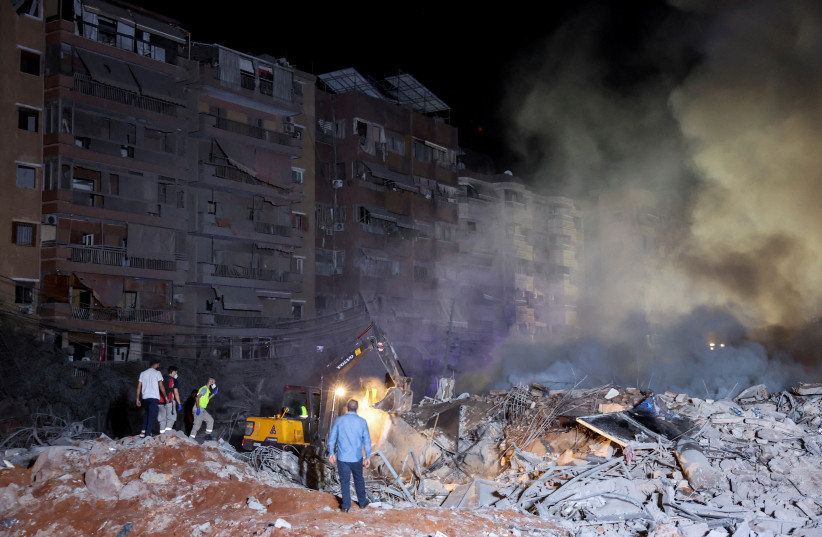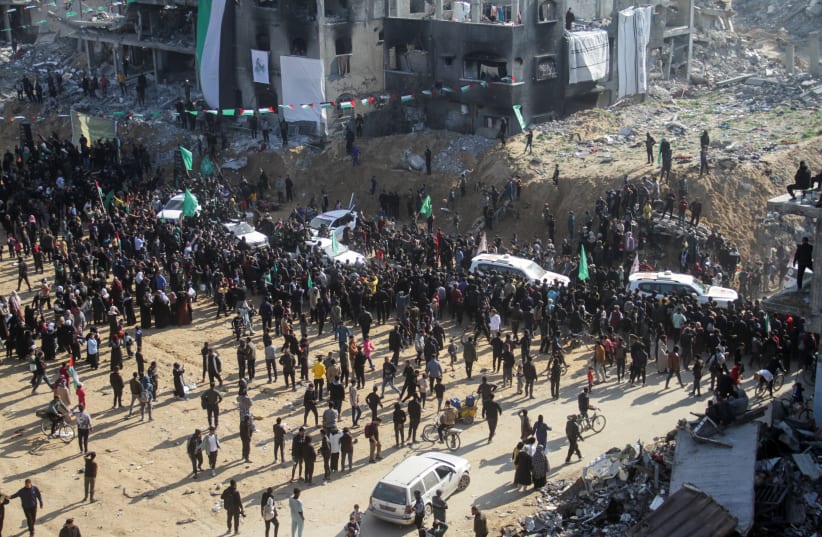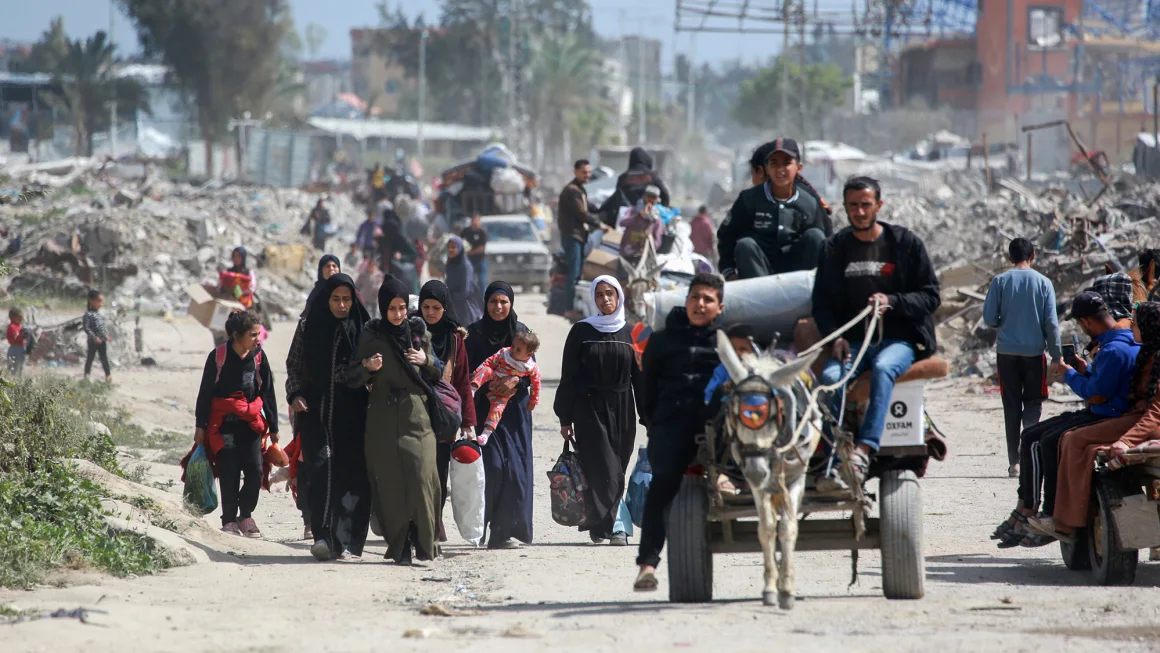Foreign
IDF strike targeted Hezbollah chief Sayyed Hassan Nasrallah in Beirut

The IDF strike hit Hezbollah’s central headquarters in Dahiyeh, Beirut, built under residential buildings.

Updated to reflect that Sayyed Hassan Nasrallah has yet to be confirmed killed in Israel’s strike.

The IDF targeted Hezbollah chief Sayyed Hassan Nasrallah in a strike on the terror organization’s central headquarters in Beirut Friday evening, the IDF reported after witnesses in Beirut told Reuters they had heard multiple blasts and saw clouds of smoke rising from the city.
An Israeli official also confirmed to The Jerusalem Post that the Nasrallalh had been one of the targets of the attack. The official added, “Hard to believe he [Nasrallah] got out of it alive.”
Israeli officials suspect that Hezbollah leader Hassan Nasrallah was in the bunker targeted in the recent bombing, and anyone inside would struggle to survive such an attack.
About three hours before the strike, Prime Minister Benjamin Netanyahu consulted with Defense Minister Yoav Gallant and Chief of Staff Herzi Halevi. A security source told the Qatari newspaper Al-Araby Al-Jadeed that “the extent of the destruction in Dahieh is enormous. Lebanon has reinforced all ambulances and dispatched them to the scene.”
Reuters reported that Nasrallah was alive, citing a source close to Hezbollah. Iran’s IRGC-controlled Tasnim News Agency also reported he was alive, and an additional Hezbollah operative has also stated Nasrallah survived the attack.
“Hezbollah’s central headquarters was intentionally built under residential buildings in the heart of the Dahiyeh in Beirut as part of Hezbollah’s strategy of using Lebanese people as human shields,” IDF Spokesman R.-Adm. Daniel Hagari stated in an evening address.
Hagari said that the targeted building was the epicenter of Hezbollah’s terror activities.
Defense Minister Yoav Gallant, at the time of the strike, was at the Israel Air Force’s (IAF) command and control center, where he monitored the strike against Hezbollah’s headquarters, the Defense Ministry stated.
Other senior officials, including IDF Chief of Staff Herzi Halevi and Commander of the IAF, were also present.
Prime Minister Benjamin Netanyahu cut his trip to New York short and plans to leave for Israel Friday night on Shabbat, following the IDF strike on Beirut that targeted Hezbollah leader Hassan Nasrallah.
Following a situation assessment after the strike, the IDF stressed that it is prepared in all offensive and defensive arenas. A senior security official told army radio that anyone in the Hezbollah headquarters will not get out alive, and they are closely following what is developing in Beirut.

Defense Minister Yoav Gallant at the IAF command and control center, where he closely followed the strike on Hezbollah’s headquarters, September 27, 2024. (credit: ARIEL HERMONI / DEFENSE MINISTRY)
The IDF added that there was no change in the Home Front Command directives.
According to Israeli sources, Israel informed the US of the strike shortly before, and Prime Minister Benjamin Netanyahu authorized the strike from New York.
The Pentagon later said that the US did not have advanced warning of an Israeli strike in Beirut, and US Defense Secretary Lloyd Austin spoke with his Israeli counterpart as the operation was ongoing, Reuters reported. Later, US President Joe Biden also said he did not know the strike would occur beforehand.
“After almost a year of Hezbollah firing rockets, missiles, and suicide drones at Israeli civilians, after almost a year of Israel warning the world and telling them that Hezbollah must be stopped, Israel is doing what every sovereign state in the world would do if they had a terror organization that seeks their destruction on their border, taking the necessary action to protect our people so that Israeli families can live in their homes, safely and securely,” Hagari said in his address.
IDF Spokesperson R. Admiral Daniel Hagari announces the IDF struck Hezbollah’s central headquarters in Beirut. September 27, 2024. (Credit: IDF Spokesperson’s Unit)
In response to the Israeli strike targeting Nasrallah, the Iranian embassy in Beirut released a statement on X/Twitter calling the attack “a bloody massacre, adding that it represented “a serious escalation that changes the rules of the game, bringing upon its perpetrator the appropriate.”
Successive airstrikes
The IDF targeted Beirut shortly after Israeli Prime Minister Benjamin Netanyahu vowed to continue Israel’s attacks on Hezbollah.
The southern suburbs of Beirut were hit in successive airstrikes, Hezbollah affiliate Al Manar TV reported.
Southern Beirut is known as a Hezbollah stronghold, and the Israeli air force struck the area last week, targeting 16 Hezbollah commanders, including Radwan Force commander Ibrahim Aqil. In another strike in the southern portion of the city, Israel eliminated Hezbollah drone unit chief Muhammad Hossein Sarur.
Many ambulances and civil defense vehicles arrived at the scenes of several buildings that had exploded.

Foreign
Hamas claims spokesperson killed in Israeli strike on northern Gaza

Earlier this week, Israel killed Ismail Barhoum, a member of Hamas’ political office, and Salah al-Bardaweel, another senior leader.

Hamas spokesman Abdel Latif al-Qanou was allegedly killed in an Israeli airstrike on northern Gaza, Hamas-affiliated news agency Shehab reported on Wednesday night.

Al-Qanoa was one of Hamas’s most prominent spokesmen in Gaza, and while he avoided media appearances during the months of fighting, he gave multiple interviews to Arab news channels after the ceasefire.
Al-Qanoua was killed when his tent was targeted in Jabaliya, the Hamas-run Al-Aqsa television reported. The same strike wounded several people, medical sources said.
Earlier this week, Israel killed Ismail Barhoum, a member of Hamas’ political office, and Salah al-Bardaweel, another senior leader.
Both Bardaweel and Barhoum were members of the 20-member Hamas decision-making body, the political office, 11 of whom have been killed since the start of the war in late 2023, according to Hamas sources.
Tents for Palestinians seeking refuge are set up on the grounds of a United Nations Relief and Works Agency for Palestine Refugees (UNRWA) centre in Khan Yunis in the southern Gaza Strip on October 19, 2023, amid the ongoing battles between Israel and the Palestinian group Hamas (credit: MAHMUD HAMS/AFP via Getty Images)
The IDF has yet to comment on the alleged elimination.
Increased IDF pressure in the Gaza Strip
Since fighting in Gaza was renewed at the beginning of last week, the IDF has killed 150 terrorists, including 10 top Hamas officials, The Jerusalem Post learned Tuesday.
In certain areas, the military has entered a full kilometer into Gaza, such as around the Nitzanim Corridor in central Gaza.
In addition to central Gaza, Beit Lahia, Beit Hanoun, parts of Khan Yunis, Shaboura, and Tel Sultan, the IDF has been evacuating and moving into Jabaliya.

Foreign
Dead Nigerians, Africans, others without will may lose unclaimed estates in UK

Hundreds of unclaimed estates reveal untold stories of African migration, wealth, and family ties left behind.
Thousands of people die every year in the United Kingdom without leaving a will or identifying next of kin, and among them are many Nigerians and other Africans whose estates—ranging from property to savings—remain unclaimed.
The UK government’s latest list of unclaimed estates, updated daily, includes over 170 entries connected to African-born individuals, with Nigerians making up a significant portion of the cases.

A Legacy Lost
For many migrants, the UK became a home away from home—a land of opportunity where they built wealth, purchased property, and created a life.

However, the absence of a will often results in their assets being classified as “bona vacantia” (ownerless goods), leaving them to the custody of the Crown.
Families back in Africa are frequently unaware of these estates, leading to a permanent loss of assets.
Cases like that of Adenike Adebiyi, who passed away in Hackney, London, in 2004, or Solomon Adekanmibi, who died in Colchester, Essex, in 2021, highlight the consequences of dying intestate.
With no identified next of kin or missing documentation, their estates remain unclaimed, and their legacies risk being forgotten.
Why It Matters
This phenomenon underscores a critical issue: many African families are unaware of their relatives’ financial situations abroad.
Migration often disrupts communication, and without clear documentation, the wealth built overseas remains beyond reach.
The loss isn’t just financial—it’s deeply cultural and emotional. Unclaimed estates represent untold family histories, connections, and the struggles of migrants who built their lives in the diaspora.
The Challenges
Lack of Awareness:
Most families in Nigeria and other African countries are unaware of their relatives’ estates abroad or how to access them.
Genealogical Gaps:
The information provided in official records is often incomplete. For example, many entries in the UK unclaimed estates list lack detailed family history or next-of-kin information.
Cultural Hesitations:
In many African cultures, discussing death and wills is considered taboo, leading to reluctance in planning for asset distribution.
A Call to Action
African governments, community organizations, and legal professionals need to raise awareness about this issue.
Here’s what can be done:
Encouraging Will Writing: Migrants in the diaspora should be educated about the importance of drafting wills to protect their assets.
Genealogical Support: Families in Africa can be assisted in tracing unclaimed estates through local or international partnerships.
Public Awareness Campaigns: Social and traditional media can highlight the importance of estate planning and share resources for families.
How to Check the List
The UK government maintains a public Unclaimed Estates List that is updated daily.
Families can search the list by name, place of birth, or other identifiers to check for potential claims.
Final Thoughts
For many Nigerians and Africans in the UK, their unclaimed estates represent more than just wealth—it’s a story of migration, resilience, and identity.
By addressing this growing issue, families can reclaim their heritage, and the legacy of those who journeyed to the diaspora need not be forgotten.
Here is the latest daily update as of March 24, 2025. Check the list

Foreign
Israel approves controversial proposal to facilitate emigration of Palestinians from Gaza

Israel’s security cabinet has approved a controversial proposal to facilitate Palestinian emigration from Gaza, a move critics warn could amount to ethnic cleansing.

Israeli Finance Minister Bezalel Smotrich on Sunday said the security cabinet approved the proposal by Defense Minister Israel Katz to organize “a voluntary transfer for Gaza residents who express interest in moving to third countries, in accordance with Israeli and international law, and following the vision of US President Donald Trump.”

The decision marks a remarkable endorsement of a plan once considered a far-right fantasy – and comes despite the prime minister’s earlier pledge not to permanently displace Gaza’s civilian population.
Critics have said that any mass displacement of Gazans in the midst of a devastating war would amount to ethnic cleansing, an act associated with war crimes and crimes against humanity under international law. Israeli officials have countered that emigration would be voluntary and in line with international legal standards.
But aid groups argue that Israel’s war has made life in Gaza nearly impossible. Martin Griffiths, the United Nations’ top emergency relief official, has called the enclave “uninhabitable,” saying its people are “witnessing daily threats to their very existence.”
The Israeli approval would establish an administration within the defense ministry “to prepare and facilitate the safe and controlled movement of Gaza residents who wish to voluntarily move to third countries,” according to a statement from the defense ministry.
Its work would include “establishing movement routes, pedestrian checks at designated crossings in the Gaza Strip,” and infrastructure to enable people to leave.
Israeli officials have presented the plan as a fulfillment of a desire by Trump to take over Gaza, expel its Palestinian population to neighboring countries and turn it into a Middle Eastern “riviera.”
The Palestinian Authority’s Minister of State for Foreign Affairs Varsen Aghabekian Shaheen told CNN’s Becky Anderson last month that Palestinians “are steadfast to stay in their land and will not move.”
Trump’s ‘vision’
Katz said Sunday that Israel is using “all means to implement the vision of the US president,” according to the defense ministry statement.
This month, Trump appeared to backtrack on his comments about displacing Palestinians, telling reporters that “nobody is expelling any Palestinians.” Steve Witkoff, the US special envoy to the Middle East, said last month that the US initiative to rebuild Gaza won’t necessarily amount to an “eviction plan” and that it was designed to “shake up everybody’s thinking.”
Last year, Israeli Prime Minister Benjamin Netanyahu said his country had no intention to displace Palestinians or occupy Gaza.
Related articleTrump says ‘nobody is expelling Palestinians,’ weeks after saying they should be moved to Arab states
“I want to make a few points absolutely clear: Israel has no intention of permanently occupying Gaza or displacing its civilian population,” Netanyahu said in a video statement in January 2024.
Trump’s proposal has, however, brought the idea further into the mainstream, with Israeli politicians now openly discussing mass emigration of Gazans as a solution to the war. And Katz last week said that Israel may maintain a permanent presence in the enclave.
Israeli rights group Peace Now criticized the plan, saying “the establishment of the administration to expel Palestinians from Gaza is one of the stupidest moves by a government that has lost all direction and logical thinking.”
The prospect has also drawn sharp rebuke from Arab leaders, especially Egypt and Jordan, who would be expected to absorb the large number of expelled Palestinians. Experts have also warned that displacing Palestinians would further destabilize the region and threaten the security of neighboring states.
Smotrich said Sunday that the security cabinet also approved the expansion of Jewish settlements in the occupied West Bank, noting that 13 areas in the West Bank would be split from existing settlements and would be recognized as independent settlements.
“Instead of hiding and apologizing – we are raising the flag, building, and settling. This is another important step on the path to actual sovereignty in Judea and Samaria,” he said, using the name by which Israelis refer to the West Bank.
The Yesha Council, an umbrella body representing Jewish settlements, said that as of January 2024, there were 150 settlements in the West Bank.
It said that the decision exposes a “long-standing lie that (Israel) does not establish new settlements, but only ‘neighborhoods’ of existing settlements” and that it is “another nail in the coffin that the Government of Israel is preparing for the only chance for a future of peace and security.”
A statement sent by Smotrich’s office said the move comes against “the backdrop of the approval of tens of thousands of housing units in Judea and Samaria and represents another significant step in the process of normalizing and regulating the settlement.”
Smotrich and other right-wing ministers have been pushing an aggressive expansion of settlements on the path to declaring Israeli sovereignty over the West Bank, which would be in defiance of international law and UN Security Council resolutions.
Israel says it will maintain ‘permanent’ presence in Gaza unless hostages are freed

-

 News1 week ago
News1 week agoPlateau gov’t expresses concern over violence in Shendam LGA, calls for calm
-

 Politics1 week ago
Politics1 week agoOpposition leaders announce coalition to challenge Tinubu in 2027
-

 Opinion1 week ago
Opinion1 week agoSule Lamido, PDP, and the politics of defection.
-

 Politics1 week ago
Politics1 week agoYahaya Bello deceptively arranging recall of Senator Natasha, desperate to replace her – Constituents
-

 Foreign5 days ago
Foreign5 days agoHouthis declare Ben-Gurion Airport ‘no longer safe’ after renewed Gaza fighting
-

 Politics1 week ago
Politics1 week agoAtiku, El-rufai, Obi condemn Tinubu’s suspension of Rivers Governor, demand reversal
-

 News6 days ago
News6 days agoWhy Christ Embassy’s Pastor Chris holds Abuja mega crusade – Fisho
-

 Politics1 week ago
Politics1 week agoLagos PDP tackles Jandor for defecting to APC










